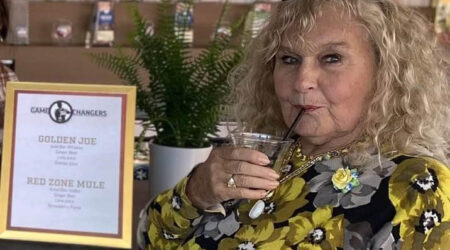Burn, Baby, Burn
Amongst things like reading three books simultaneously, making the best scrambled eggs in the history of scrambled eggs, and downing a minefield of vodka like it ain’t no thang, I’m also a well-versed expert on teen angst. And I don’t mean, “No, Mom, I don’t want to eat because I’m fat!” angst; we’re talking hardcore, […]

Amongst things like reading three books simultaneously, making the best scrambled eggs in the history of scrambled eggs, and downing a minefield of vodka like it ain’t no thang, I’m also a well-versed expert on teen angst. And I don’t mean, “No, Mom, I don’t want to eat because I’m fat!” angst; we’re talking hardcore, leather jacket-wearing, Slipknot-listening, wall-punching, private property-vandalizing angst.
There’s this period of my developmental history that ranges from ages 11 to 14 that I’ve come to fondly dub “The Dark Ages.” During said period, I was the girl with the pink hair and accompanying grimace that, for all her straight-A’s and bookworm tendencies, you didn’t ever want to cross. Partly because I ran with a crowd of long-haired boys who had long-haired, pierced, tattooed older brothers. Mostly, though, it was because you’d heard of that one time my friend, Luke, and I snuck out of school during lunch to get the paraphernalia necessary to set the contents of some rude chick’s locker on fire – and you figured that if I could do that without even so much as a flinch towards my conscience, there was no telling what else I’d be willing to do to avenge my inexplicable anger.
My case, I’m aware, might be more extreme than the majority of the population {thankfully, because if it isn’t the whole world would’ve been set on fire by now}, but I’m still convinced that regardless of how strongly angst decides to manifest itself, the very instance of it being there is universal. It isn’t just hormones and ensuing bodily changes; it’s the blatant, ungraceful realization that you’ve been lied to – no, the world really doesn’t care all that much about you, and no, sometimes things just don’t work out, but yes, you are still somehow expected to take it like a champ and run with it. It’s the “X” on the map of your life thus far that explicitly marks the end of blissful ignorance and the beginning of complete disillusionment. And while your journey doesn’t stop there, you’re asked to pause and give your eyes a second to adjust to the complete crap the filmy glasses of your youth had been successfully covering.
The loss of innocence is a theme writers have explored and been consumed with for centuries, which is probably why it’s become a bit of a cliché in contemporary literary fiction. What J. D. Salinger did with Holden Caulfield revolutionized the way the voice of the young and slightly disturbed {okay, maybe more than slightly} reached an audience comprised of both youth and veterans, and in many ways paved a path for Stephen Chbosky’s The Perks of Being a Wallflower and S. E. Hinton’s The Outsiders. Holden is time-proof. Holden is iconic. Making the well-meaning efforts of new writers to contribute their own reimagination of a youthful voice to the conversation relatively shoddy, and bound to pale in comparison {and, yes, I’m talking about you, James Franco – whoever decided to place a stoned 12-year-old on the cover of your miserable short story collection should be fired; in this case, your particular brand of suburban teen rebellion does not sell [Seriously, what the hell actually happens in Palo Alto? Nothing, that’s what.]}.
Enter my new writer-crush, Aryn Kyle.
Apart from having a snappy title, her short story collection, Boys and Girls Like You and Me, is the most accurate and complete meditation I’ve read in recent years on how it feels, and what it means, to grow up in our current cultural landscape. Kyle’s characters are the likes of pathological liars, underachieving college co-eds, high school dramatists in seedy affairs, and sardonic term paper ghost-writers; the angst is inherent, the potential for disillusionment so predictably present. But instead of merely showing us what they are, Kyle hints at what they have been, and takes us further into the possibilities of what they may become. While the modern American novel is tainted with characters who are flawed and simply can’t deal with themselves, Kyle’s collection delivers a group of strong, abrasive, shocking narrators and protagonists who are able to toe the line between being frustrating and unlikable, and being the friends or the selves that we accept as being completely maladjusted – and then loving them, moving them, congratulating them for it. Her narratives are bold not so much in their content, but in how subtly they force each character into a moment of shameless vulnerability. And it is this fearlessness to push her angsty little children to their emotional limits that allows Kyle to go beyond the all-too-common story of, “This is how it happened,” to the Salinger-level of, “This is why it happened; this is how it felt when it happened; this is what it means.”
In the collection’s titular story – placed strategically at the very end – we meet a fourteen-year-old video store employee, her hair a dried, dyed mass, her person all disheveled, her discontent disguised by her sarcasm. When I met her I experienced an unconsciously behavioral regression back to the days I spent in dog-collars and lace-up combat boots, back to The Dark Ages.
And when I was done, when I reached the last page and the girl in the story had escaped me, Aryn Kyle said to me:
“And this, this is the part I want you to know: That moment lives in my head, a thing with breath and blood. A present tense. An always – that sudden blossoming of grace and beauty and competence, all of it so unexpected, all of it so undeserved, and the feeling or knowledge or faith that somehow, someday, everything was going to be all right.”
More important than her characters, more important than her gorgeous prose-style, more important than the fact that her story-telling is transportive, is the fact that, for all the changes the formerly pink-haired me has seen over the years, the small part of me who will always be pink-haired, who will always have the asinine urge to set distinctly non-flammable things on fire, completely and without the faintest hesitation, believed her.
by Jayne Wilson
Jayne Wilson writes fiction about the likes of decapitated gnomes, compulsive hoarders, and sardonic old men. She laughs pathetically at her own jokes and is generally an impish mess. She graduated from the University of California, Davis in 2010 with a degree in English-Creative Writing.





